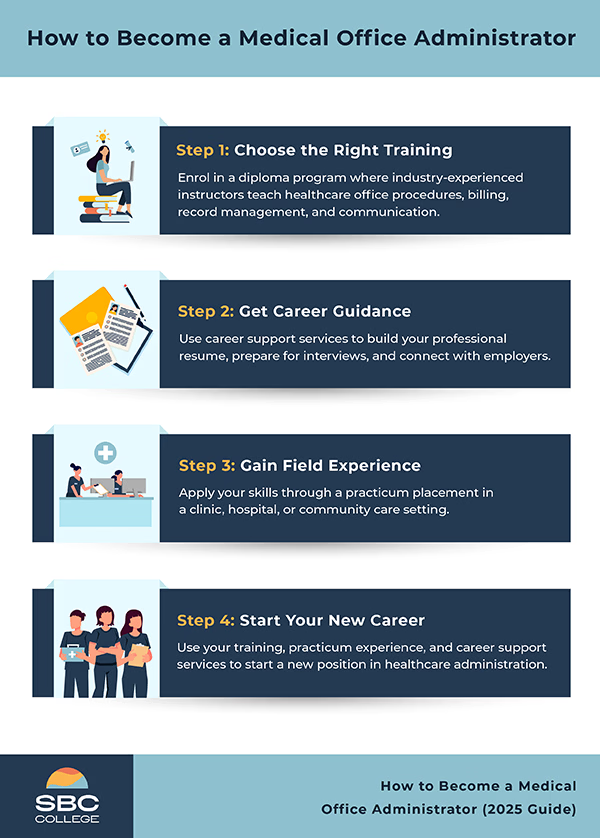Table of Contents
To become a medical office administrator, you must know how to manage patient information, coordinate communication, and keep healthcare offices organized. Those abilities come from a mix of training with industry-experienced instructors, and real-world experience in a practicum.
From studying medical terminology, procedures, and office systems to applying your skills in a healthcare setting and beginning your career, each step moves you closer to what you’ve always wanted to do: give back by helping patients and supporting the teams who make their care possible.
Let’s go through that journey together and see what it takes to become a medical office administrator.
Listen to: How to Become a Medical Office Administrator (2025 Guide)
What Does a Medical Office Administrator Do?
As a Medical Office Administrator (MOA), you’ll play an important role in supporting healthcare teams and helping ensure each patient’s experience is seamless and well-supported.
In a walk-in clinic, that could mean verifying health cards, registering patients, managing the waitlist, updating electronic medical records (EMRs), printing lab or imaging requisitions, sharing preparation steps, and booking follow-ups.
In a hospital unit, your work focuses on order entry, admissions, transfers, discharges, and routing results or providing instructions to the right health care professional.
In private practices such as dental, optometry, chiropractic, or physiotherapy, you might greet clients, maintain records, coordinate room schedules, and process payments.
Across these settings, the core MOA responsibilities remain the same: to support patients through their visit and provide healthcare providers with timely, accurate information.
Why Choose a Career in Medical Office Administration?
A career in medical office administration offers job stability, diverse opportunities, and the chance to support your community through meaningful work. You’ll be closely involved in patient care and coordination, helping healthcare teams deliver organized and timely service.
Since this role involves frequent interaction with patients and staff, it helps to build good communication skills, patience, and a sharp eye for detail through the right training. These strengths help patients feel cared for and allow healthcare teams to focus fully on providing quality care.
In addition to the satisfaction of helping others, this career offers consistent demand and strong earning potential.
Growing Demand in Healthcare
With an aging population and rising demand for accessible services, there is an increasing need for skilled professionals who can manage patient information, coordinate communication, and support clinical teams in delivering timely care.
Canada’s healthcare system depends on efficient administration so patients can receive the care they need.
By training in medical office administration, you can help contribute to that effort. Your ability to manage documentation accurately, keep records organized, and communicate effectively across departments helps healthcare operations run efficiently and makes it easier for patients to receive quality care.
Competitive Salary
Employers for medical office administrators include hospitals, doctors’ offices, medical clinics, specialized practices such as dental, optometry, chiropractic, and physiotherapy offices, outpatient care centres, community organizations, and government health agencies.
With this wide range of employers, medical office assistants can earn $50,980 annually.
Whether you’re drawn to healthcare for its sense of purpose or the reliable career it offers, medical office administration offers both. It’s a field with steady employment, good earning potential, and the opportunity to contribute to the healthcare system through quality patient care.
Steps to Become a Medical Office Administrator
Starting a career in a healthcare field like medical office administration (MOA) begins with gaining the skills and experience that help healthcare teams stay organized and patients feel supported throughout their care. Here’s how to become an MOA:
Step 1: Choose the Right Training
When comparing options, look for a diploma program where industry-experienced instructors train you to coordinate appointments, manage medical records, communicate with patients, and support daily operations in diverse healthcare settings. The best program will also provide flexible learning options and dedicated student support, helping you prepare for your new career while balancing personal and professional commitments.
Step 2: Get Career Guidance
Some diploma programs also include career coaching services that guide you through the transition from student to professional. Choose a college that will help you create a well-presented resume, prepare for interviews, and connect with employers who are hiring healthcare professionals.
Step 3: Gain Field Experience
Look for a program that includes a practicum placement where you will apply what you’ve learned in a professional healthcare environment. In the best program, you will work alongside medical office professionals, interact with patients, and observe how clinics, hospitals, or community care centres operate day to day.
In a practicum, you will build confidence, strengthen your practical skills, and develop connections to support your new career.
Step 4: Start Your New Career
With your diploma, practicum experience, and career support, you’ll be ready to begin a meaningful new career that keeps healthcare organized, patients supported, and every visit running seamlessly.

Essential Skills for Medical Office Administrators

Success as a medical office administrator comes from having a blend of practical skills and professional habits. Here are the capabilities you’ll need to work in a medical office setting:
1. Technical Skills
- Medical Office Procedures
Methods for handling patient registration, appointment scheduling, and health information management within a medical office setting. - Anatomy and Medical Terminology
Apply knowledge of medical terms, body systems, and disease processes when interpreting and documenting patient information. - Clinical Procedures
Understand basic diagnostic tests, infection control standards, and medication terms so you can support safe clinical practices. - Health Unit Procedures
How to complete order entry forms and coordinate hospital operations, including patient admissions, transfers, and discharges. - Medical Transcription
Convert dictated or written medical information into accurate, confidential records.
2. Computer Skills
Essential for handling electronic records, reports, and communication systems efficiently.
- Electronic Medical Records and Billing: Manage patient registration, scheduling, healthcare coverage, and claim submissions through electronic record systems.
- Microsoft Excel: Organize patient lists, monitor billing, and prepare data for reports.
- Microsoft Outlook: Keep staff messages, appointments, and reminders well-coordinated.
3. Communication Skills
Strong communication supports every part of a healthcare office. You need to know how to document information accurately, communicate professionally with patients and staff, and review records and correspondence for accuracy.
These medical office admin skills allow you to contribute to a well-functioning healthcare setting where patients receive attentive care and medical teams depend on your accuracy and organization.
Why Choose SBC College for Medical Office Administration Diploma?
Get Career-Ready in Under a Year
SBC College’s Medical Office Administration diploma program prepares you for a new career in healthcare administration in less than a year. The program covers anatomy, medical terminology, transcription, clinical and health unit procedures, and electronic medical records and billing. You’ll learn how to manage patient documentation, schedule appointments, process billing, and support medical teams across hospitals, clinics, and community care settings. These areas of training help you develop the technical, organizational, and communication abilities needed to succeed in any healthcare office.
Gain Hands-On Experience Before You Graduate
Your practicum placement, included as part of your diploma, places you in a healthcare setting before graduation. You’ll work alongside professionals, apply your training in real situations, and build the workplace connections that often lead directly to employment.
Learn From Industry-Experienced instructors
Learn from medical office professionals who bring years of field industry experience into the class. Their insights help you understand how healthcare offices operate and what’s expected from new graduates, helping prepare you for your practicum and new career.
Get Support at Every Stage
Support begins as soon as you start the program, with a live onboarding session and the Becoming a Master Student course. These help every new student set goals and strengthen study habits. The SBC College Student Services team offers academic guidance, referrals for wellness, and early intervention if challenges arise. The Career Services team provides lifetime assistance with resumes, interview preparation, and job search strategies, helping you stay career-ready long after graduation.
Study on Your Schedule
Study one course at a time through SBC College’s modular format. Online learning options help you balance your studies with work and family life.
Start a New In-Demand Career
Graduates pursuing careers as medical office assistants, hospital unit clerks, medical secretaries, medical billing clerks, and medical receptionists will find themselves in demand. These positions offer stability, competitive pay, and the satisfaction of contributing to patient care every day.
This combination of practical training, flexible learning, and ongoing support is what many students appreciate about their experience at SBC College. Here’s how Laur B., SBC College Medical Office Administration Graduate, explains it:
“It has been a wonderful experience at SBC College. The classes are relevant. The staff and instructors are friendly and willing to help. The college itself is very welcoming. I’m very happy with my experience here.”
To get started with your training, contact an admissions advisor today.
Frequently Asked Questions (FAQ)
How can I qualify for the Medical Office Administration program?
To qualify, you’ll need a high school diploma or GED. If you don’t have one, there’s a mature admissions process. Contact an admissions advisor for more information.
How long does the program take to complete?
SBC College’s Medical Office Administration diploma program can be completed in under a year, including a 5-week practicum placement in a healthcare setting.
Can you work remotely as a medical office administrator?
Yes, some medical office responsibilities such as billing, transcription, appointment scheduling, and electronic record management can be done remotely. This creates opportunities for flexible work arrangements, employment beyond your local area, contract and freelance work, as well as work-from-home arrangements.
Remote MOA job opportunities depend on the employer, healthcare setting, and specific role requirements.
Where can MOAs find employment?
Medical office administrators work in diverse healthcare settings, including doctors’ offices, walk-in clinics, hospitals, and private practices such as dental, optometry, chiropractic, and physiotherapy offices. You’ll also find opportunities in outpatient care centres, insurance companies, government health agencies, community health organizations, nursing homes, long-term care facilities, and diagnostic imaging centres. This variety allows you to choose an environment that aligns with your career goals and interests.
How competitive is the job market for MOAs?
The MOA job market remains strong and offers plenty of opportunities across the country. As healthcare needs expand, clinics, hospitals, and community care centres continue to rely on trained professionals to coordinate daily operations and patient services.
How do medical office administrators contribute to healthcare teams?
Medical office administrators keep healthcare settings running efficiently by maintaining accurate patient information, coordinating schedules, and facilitating communication between patients and providers.






